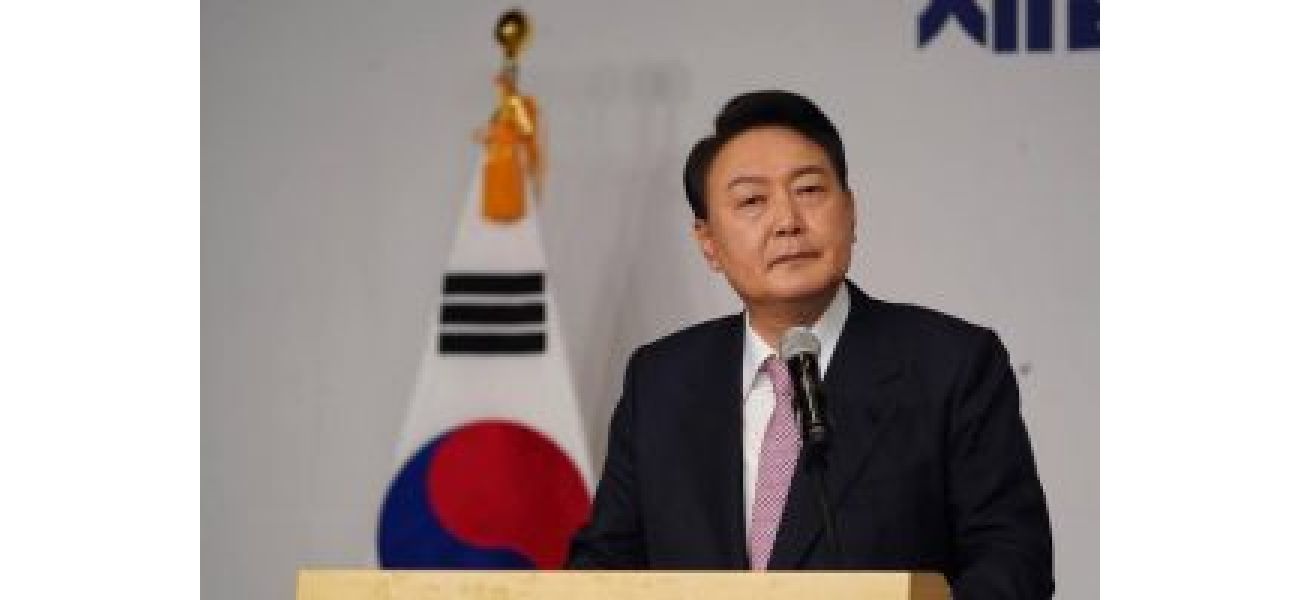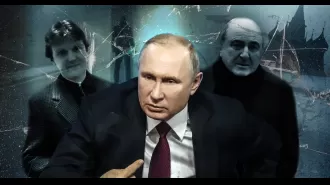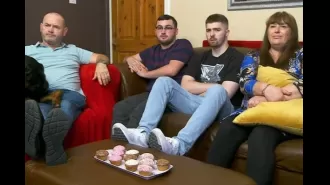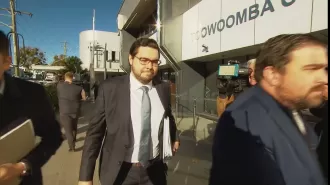South Korea court grants warrants for Yoon's arrest and office search after impeachment.
A South Korean court has issued warrants to detain former President Yoon Suk Yeol and search his office and residence over his declaration of martial law, which is being investigated for possible rebellion.
December 31st 2024.

On Tuesday, a court in South Korea issued warrants to detain former President Yoon Suk Yeol and search his office and residence. This is in connection to his brief declaration of martial law, which has sparked controversy, with some calling it an act of rebellion. The country's anti-corruption agency is currently investigating the matter, but many experts believe that Yoon will not face detention or searches unless he is officially removed from office.
According to a statement from the Corruption Investigation Office for High-Ranking Officials, which is leading a joint investigation with police and military authorities, the Seoul Western District Court issued the warrants to detain Yoon and search his presidential office and residence in central Seoul. Under South Korean law, rebellion is a serious crime that can result in the death penalty or life imprisonment. While Yoon has immunity from most criminal prosecutions as a president, this does not apply to allegations of rebellion or treason.
Yoon's powers have been suspended since he was impeached by the opposition-controlled National Assembly on December 14. This was due to his declaration of martial law, which involved the deployment of troops and police officers on the streets of Seoul. Yoon has defended his actions, stating that it was a necessary warning to the main liberal opposition Democratic Party. He has accused the party of being "anti-state forces" that have used their legislative majority to impeach top officials, undermine the government's budget, and show sympathy towards North Korea.
The Constitutional Court is currently reviewing the case and will determine whether to dismiss Yoon as president or reinstate him. However, experts believe that Yoon is likely to ignore the warrants issued for his detention and search. He has previously ignored requests by investigative authorities to appear for questioning, and his presidential security service has cited a law that prohibits raids on sites containing state secrets as a reason to block attempts to search his office and residence.
A lawyer representing Yoon has rejected the anti-corruption agency's request for warrants, arguing that they do not have the legal authority to investigate rebellion charges. As of now, the anti-corruption agency has not disclosed their plans for how they will proceed with the warrants. According to Choi Jin, director of the Seoul-based Institute of Presidential Leadership, the only way for Yoon to be detained is if he voluntarily allows it, as a physical confrontation with his security service would not be appropriate.
Choi also believes that investigators will still visit Yoon's residence to show that they are carrying out their work fairly and strictly. Park Sung-min, president of a political consulting firm in Seoul, MIN Consulting, suggests that the push for an arrest warrant is a tactic to pressure Yoon into cooperating with the investigation. In the past, former President Park Geun-hye, who was also impeached, refused to meet with prosecutors while in office. She was eventually questioned and arrested after being removed from office by the Constitutional Court.
Yoon's declaration of martial law lasted only six hours but caused significant political turmoil. It also disrupted high-level diplomacy and caused financial markets to fluctuate. Despite Yoon's deployment of troops and police, enough lawmakers were able to enter the assembly chamber and unanimously overturn the martial law. Yoon's defense minister, police chief, and several top military commanders have already been arrested for their roles in the enactment of martial law.
Yoon has maintained that his intention was not to stop the functioning of the assembly, but rather to maintain order. He has also denied planning to arrest politicians. However, the statements of commanders of military units involved in the assembly incident contradict his claims. Kwak Jong-keun, the commander of the Army Special Warfare Command, testified at the National Assembly that Yoon had instructed them to forcefully remove lawmakers. Kwak did not follow through with these orders.
The political crisis in South Korea has only intensified with the recent impeachment of acting President Han Duck-soo. This was due to disagreements over his refusal to fill three justice seats at the Constitutional Court. Observers believe that the addition of more justices could impact the court's ruling on Yoon's impeachment. In the meantime, Deputy Prime Minister and Finance Minister Choi Sang-mok has become South Korea's new interim leader.
According to a statement from the Corruption Investigation Office for High-Ranking Officials, which is leading a joint investigation with police and military authorities, the Seoul Western District Court issued the warrants to detain Yoon and search his presidential office and residence in central Seoul. Under South Korean law, rebellion is a serious crime that can result in the death penalty or life imprisonment. While Yoon has immunity from most criminal prosecutions as a president, this does not apply to allegations of rebellion or treason.
Yoon's powers have been suspended since he was impeached by the opposition-controlled National Assembly on December 14. This was due to his declaration of martial law, which involved the deployment of troops and police officers on the streets of Seoul. Yoon has defended his actions, stating that it was a necessary warning to the main liberal opposition Democratic Party. He has accused the party of being "anti-state forces" that have used their legislative majority to impeach top officials, undermine the government's budget, and show sympathy towards North Korea.
The Constitutional Court is currently reviewing the case and will determine whether to dismiss Yoon as president or reinstate him. However, experts believe that Yoon is likely to ignore the warrants issued for his detention and search. He has previously ignored requests by investigative authorities to appear for questioning, and his presidential security service has cited a law that prohibits raids on sites containing state secrets as a reason to block attempts to search his office and residence.
A lawyer representing Yoon has rejected the anti-corruption agency's request for warrants, arguing that they do not have the legal authority to investigate rebellion charges. As of now, the anti-corruption agency has not disclosed their plans for how they will proceed with the warrants. According to Choi Jin, director of the Seoul-based Institute of Presidential Leadership, the only way for Yoon to be detained is if he voluntarily allows it, as a physical confrontation with his security service would not be appropriate.
Choi also believes that investigators will still visit Yoon's residence to show that they are carrying out their work fairly and strictly. Park Sung-min, president of a political consulting firm in Seoul, MIN Consulting, suggests that the push for an arrest warrant is a tactic to pressure Yoon into cooperating with the investigation. In the past, former President Park Geun-hye, who was also impeached, refused to meet with prosecutors while in office. She was eventually questioned and arrested after being removed from office by the Constitutional Court.
Yoon's declaration of martial law lasted only six hours but caused significant political turmoil. It also disrupted high-level diplomacy and caused financial markets to fluctuate. Despite Yoon's deployment of troops and police, enough lawmakers were able to enter the assembly chamber and unanimously overturn the martial law. Yoon's defense minister, police chief, and several top military commanders have already been arrested for their roles in the enactment of martial law.
Yoon has maintained that his intention was not to stop the functioning of the assembly, but rather to maintain order. He has also denied planning to arrest politicians. However, the statements of commanders of military units involved in the assembly incident contradict his claims. Kwak Jong-keun, the commander of the Army Special Warfare Command, testified at the National Assembly that Yoon had instructed them to forcefully remove lawmakers. Kwak did not follow through with these orders.
The political crisis in South Korea has only intensified with the recent impeachment of acting President Han Duck-soo. This was due to disagreements over his refusal to fill three justice seats at the Constitutional Court. Observers believe that the addition of more justices could impact the court's ruling on Yoon's impeachment. In the meantime, Deputy Prime Minister and Finance Minister Choi Sang-mok has become South Korea's new interim leader.
[This article has been trending online recently and has been generated with AI. Your feed is customized.]
[Generative AI is experimental.]
0
0
Submit Comment





